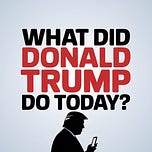The Trump administration’s recent actions across environmental policy, foreign relations, immigration, education, and civil service reflect a consistent strategy of politicized messaging, executive overreach, and ideological posturing over substantive governance. The White House’s Earth Day statement, claiming Trump “follows science,” largely serves as propaganda, overstating environmental progress while downplaying the administration’s rollbacks on emissions standards and renewable energy development. It promotes fossil fuel expansion under the guise of innovation, framing deregulation as stewardship and reducing serious ecological debates to culture-war grievances.
Vice President JD Vance’s speech in India echoed this approach, using a foreign policy platform to push domestic populist themes, grievance politics, and arms sales rather than genuine diplomacy. His remarks were heavy on personal anecdotes and ideological attacks, but light on policy specifics, reducing the event to a campaign-style performance rather than meaningful engagement with India.
Press Secretary Karoline Leavitt’s recent briefing continued the administration’s partisan rhetoric, particularly on immigration, student debt, and trade, offering little substance or policy clarity. Her framing of migrants as “criminal invaders” and debtors as irresponsible individuals reflects the administration’s punitive, oversimplified narratives. Economic claims, foreign policy updates, and civil service changes were delivered without evidence or meaningful detail, reinforcing the administration’s hostility toward transparency and independent journalism.
In the courts, the administration suffered a setback when a federal judge blocked its attempt to dismantle Voice of America, citing violations of press freedom and federal law. Similarly, Harvard University and over 150 other academic institutions pushed back against the administration’s use of funding as leverage to impose political demands, with Harvard filing suit to protect academic independence.
The administration also escalated its attack on immigration courts, firing judges without cause in an apparent effort to weaken due process and accelerate deportations. Meanwhile, Minnesota Attorney General Keith Ellison sued the administration over its executive order banning transgender athletes from women’s sports, challenging its legality and framing it as discriminatory and unconstitutional.
Finally, the Supreme Court ruled against the administration in a key immigration case, affirming that voluntary departure deadlines must accommodate weekends and holidays—a small but notable check on the administration’s harsh immigration policies. Together, these developments highlight the administration’s continued prioritization of ideological enforcement and political theater over coherent, lawful, and effective policy-making.













Share this post